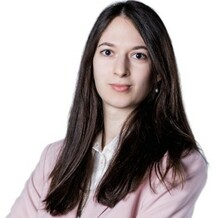
Klara Pešić
Paul Scherrer Institut
Supervisor: Dr. Bojan Niceno
Brief Bio
Klara began her journey into Computational Fluid Dynamics (CFD) in 2019 as a member of the Formula Student team “FSB Racing Team”, where she worked on the development of aerodynamics and cooling systems. In 2023 she earned her University Master in Physics at the University of Zagreb, Croatia on the topic of Finite Volume and Finite Element simulations of condensation. Looking for experience in the industry, Klara became a CFD intern at AVL-AST Maribor, Slovenia. After graduating, she continued working there as a Simulation Engineer. In 2024, Klara joined Paul Scherrer Institut in Switzerland as a PhD student in the CaviPRO DC8 research project.
Project Description
High-fidelity simulation of HC devices demands resolutions of wide range of length and time scales. This requires development of systematic multi-scale / multi-layer modelling approach, which is still elusive. This PhD project will use DNS based on a compressible flow solver to simulate a wide range of time- and space-scales relevant in HC. DNS results will be used to develop closure models, which will facilitate simulations of device-scale flow processes with and without suspended particles. The developed multi-layer / multi-scale approach will be implemented with adopted programming models that offers performance, portability and productivity and applications in various HC fields. The key objectives are: 1) Develop a multi-scale / multi-layer modelling framework; 2) Implement and port the developed modelling and numerical framework on HPC including incorporated compressibility and particle presence; 3) Validate the computed results by comparison with experimental data (in collaboration with DC3, DC10; 4) Establish a methodology for simulating HC device-scale flows. The key expected results are: 1) A new mass-transfer model for cavitation sufficiently validated against experiments; 2) Observation of detailed three-dimensional flow field based on the simulation, which cannot be measured experimentally yet; 3) A proposed methodology, which scales well on emerging computational platforms and which can be applied to HC device-scale simulations.



